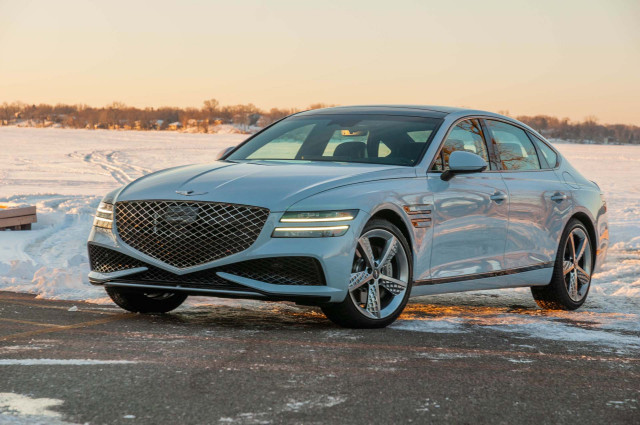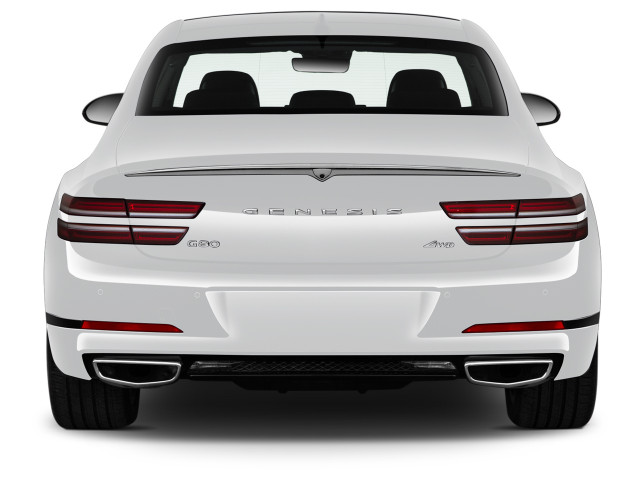LIKES
- Shapely fastback design
- Spectacular interior
- Healthy twin-turbo V-6
- A wealth of standard features
- Excellent warranty, with free service
DISLIKES
- Lighting look works hard, maybe too hard
- Suspension needs one more massage
- Small dealer network
BUYING TIP
With the 2022 G80, Genesis sketches a fastback mic-drop and draws ever closer to German four-doors with vibrant performance.
What kind of car is the 2022 Genesis G80? What does it compare to?
With the G80, Genesis wraps a sleek shape around a mid-size sedan with room for up to five people—better make sure at least one of them is well-heeled, while you’re at it. In rear-wheel drive or all-wheel drive, with a turbo-4 or twin-turbo V-6, respectively, the G80 reps Hyundai’s luxury line against rivals like the Audi A7, BMW 5-Series, and Mercedes E-Class.
Is the 2022 Genesis G80 a good car?
It’s sophisticated and stunning, more so because it comes from a brand that’s newer than most 4K TVs. It earns a TCC Rating of 7.5 out of 10.
What’s new for the 2022 Genesis G80?
Sport models have standard all-wheel drive, and a 14.5-inch touchscreen graces the dash. Otherwise the G80 remains a stunning sedan with lithe looks, strong performance, and top-flight safety and technology.
Through its base versions, the G80 brandishes a 300-hp turbo-4 with rear-wheel drive. Teamed with an 8-speed automatic and a multi-link suspension, it’s a fine starter kit—but we’d spend up to the AWD Sport and its 375-hp twin-turbo V-6. It rockets to 60 mph in about five seconds, pulling Mustang-like acceleration and grip along the way. The G80 skims the road surface with standard adaptive dampers that range from cushy to jittery, depending on its selected drive mode; available rear-wheel steering helps the G80 Sport take direction calmly.
Genesis stocks the G80 with insanely cozy heated and cooled front seats covered in quilted leather on its most spendy trims. There’s room for at least four on board, though the small trunk puts a cap on its ultimate utility. Small-item storage, from Yeti bottles to smartphones, is better than the fifth seat—a flat, narrow back-seat perch that straddles a letterboxed transmission tunnel.
The G80 earns the IIHS’ Top Safety Pick+ award and a five-star rating from the NHTSA. It has standard automatic emergency braking, adaptive cruise control, and blind-spot monitors, with options for a surround-view camera system and a head-up display.
How much does the 2022 Genesis G80 cost?
The G80 costs at least $49,345, and comes with 12-way power front seats, synthetic leather upholstery, Android Auto and Apple CarPlay, and a 14.5-inch touchscreen. The $64,795 3.5T AWD Sport gains Android-based digital key services and an adaptive sport suspension.
Where is the 2022 Genesis G80 made?
It’s assembled in South Korea.
Styling
A fastback in spirit, the G80 sedan bristles with exciting style.
Is the Genesis G80 a good-looking car?
It’s gorgeous, according to us. Its striking fastback look picks up two points each for the cabin and the body, for a 9 in styling.
Genesis drapes its low-slung sedan with a wide crest-like grille, pointed at its bottom and honeycombed in its texture. Thin LED ribbons strap across its headlights, leading into the side view, where the G80 takes its long, sleek shape to coupe-like lengths. Though it has a trunk, it looks like some of the most lissome hatchbacks we know. Sport versions wear dark glossy trim, with a more pronounced front bumper.
Performance
There’s sizzle to go with the G80’s steak, but it’s a cut below Kobe.
Genesis imbues the G80 with the luxuriant ride and the urgent power found in rivals. We give it two points for the powertrains and one for handling, to arrive at an 8.
Is the Genesis G80 AWD?
Some turbo-4 cars have rear-wheel drive, while others (and all twin-turbo V-6 cars) have a basic all-wheel-drive system which can send half of the torque from the rear wheels to the front end for improved traction.
With the base 300-hp 2.5-liter turbo-4, the G80 snips off 0-60 mph runs of about seven seconds. We’ve spent less time in this version, but enough to judge that its performance flair runs more mild and its engine runs less quietly than the one we’d prefer.
That would be the 375-hp 3.5-liter twin-turbo V-6 in the G80 Sport—more awkwardly, the G80 3.5T AWD Sport. With its 391 lb-ft of torque shuffling through eight automatically chosen forward gears, and drive modes that fine-tune its personality from economy to sport, it’s a genuine performer. It does disguise its brisk acceleration well: the turbos show some lag before the transmission cuts off discussion. The Sport can belt out 0-60 mph times of about five seconds, despite a hefty loaded curb weight of 4,497 lb, once it’s set to the drivetrain’s Sport mode for the quickest, crispest shifts.
The G80 rides with ease, even in 2.5T Prestige spec with its smaller 18-inch wheels and non-adaptive suspension. It’s a relatively firm compromise that works well in most pavement situations, though enthusiasts would say it’s too soft for their driving style.
That’s the niche for the Sport models, which take the standard multi-link setup and graft on camera-informed adaptive dampers that continually adjust to the road, as well as rear-wheel steering on all but the base Sport.
With those features, the G80 gets more compliance when it needs it, even with 20-inch wheels fitted that tramline along with grooves in the highway. It can judder over freeway joints and gaps and bound over two-lane roads that switch back and forth rapidly. But that can be honed down by clicking the suspension into Sport mode, which sends the revs higher while it calms the ride motions down to a light chop—and tunes the steering too heavily, we think.
In its Comfort setting, the firmness over low bumps doesn’t align perfectly with the low-grade corkscrewing that comes when the G80 sails over long, low road valleys. But those are nitpicks, and nitpicks aside, the G80 has the composure and the alert responses that show how close it’s come to the paragons in its class.
Comfort & Quality
The G80 shines brightly, in a constellation of high-buck luxosedans.
Without seat time in base versions, we’ve given the G80 an 8 for comfort. The front and back seats give us comfort, and the interior gets a nod for its exceptional fit and finishes.
The G80 measures 196.7 inches long, and sits on a 118.5-inch wheelbase. It’s squarely a mid-sizer, with a base setup that includes heated synthetic leather front seats with 12-way adjustment. All the G80s we’ve driven have been buffed up with front sport seats wearing nappa leather and dressed with power side bolsters, leg-rest extensions, and cooling and heating. In a word, they’re fantastic. Most drivers can dial in a perfect seating position and use the stout lumbar padding to sort out nagging back issues with the “posture assist” lumbar mode, maybe the most self-aware feature of any on the G80, given its demographics. If only it didn’t take an NBA reach to grab its door pulls to close it up.
Back-seat passengers get some of that cosseting, too, with tailored outboard seats shaped to fit a wide range of backsides and to sort out enough head and knee room for bigger adults. Two are fine; a third gets propped on the flat midsection of the bench seat. The G80 has ample interior storage, with a small 13.1 cubic-foot trunk.
Safety
The G80 posts great scores.
How safe is the Genesis G80?
It’s good news all around, as the IIHS gives it a Top Safety Pick+ award, while the NHTSA sets it at five stars overall. With its excellent standard safety gear earning another point, it’s an 8 here.
The G80 thrums with safety features, including automatic emergency braking, active lane control, blind-spot monitors, and automatic high-beam LED headlights. A head-up display, a surround-view camera system, and rear automatic emergency braking can be had on some models.
The G80 has a low stance and tall sides, which limit the view to the rear—reason enough to opt into the various camera systems.
Features
The G80 bundles drivers in luxury, then irritates them with infotainment.
The G80 doesn’t miss a step when it comes to standard features and cutting-edge technology—not even in warranty, with its top-flight coverage of 5 years/60,000 miles with 3 years/60,000 miles of free scheduled maintenance. It fades in value, in which it once led; it also has an infotainment controller that looks fab but ends in flub. It’s an 8 here.
The $49,345 G80 offers lots of gear, from 18-inch wheels to 12-way power front seats with heating, LED headlights, synthetic leather upholstery, and a 14.5-inch touchscreen infotainment system with Android Auto and Apple CarPlay. All-wheel-drive versions cost $52,495.
It’s pleasing to the senses, except touch. Genesis fits a knurled rotary dial on the console, and offers it as a primary control for the 14.5-inch dash-mounted touchscreen. It’s easy to circumvent its counterintuitive spin-and-click inputs with voice commands, steering inputs, or screen touches—if only the touchscreen weren’t an ab-crunch away, beyond arm’s reach.
Options on the G80 include an Advance package with a panoramic sunroof, 19-inch wheels, cooled front seats, matte wood trim, and 21-speaker Lexicon audio. A Prestige package on rear-drive G80s adds a surround-view camera system, leather upholstery, remote park assist, more front-seat adjustments, heated rear seats and a heated steering wheel, and wireless smartphone charging.
Which Genesis G80 should I buy? How much is a fully loaded Genesis G80?
We’d pick the $64,795 Genesis G80 3.5T AWD Sport, which has most of the turbo-4 car’s options as well as the electronically controlled suspension and Android-based digital key services. Options include 20-inch wheels, blind-spot cameras, nappa leather, and a 12.3-inch digital gauge cluster.
Fuel Economy
Gas mileage could be better.
Is the Genesis G80 good on gas?
EPA ratings peg it as average, and there’s no hybrid or plug-in to mitigate that. The best ratings come with the turbo-4, rear-drive G80: it checks in at 23 mpg city, 32 highway, 26 combined. That drops to 22/30/25 mpg with all-wheel drive. With all-wheel drive, the twin-turbo V-6 G80 only gets 17/26/20 mpg.

























0 comments:
Post a Comment